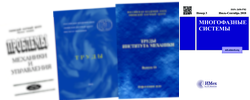

”Multiphase Systems“ were established by the Institute of the Ufa Federal Research Center of the Russian Academy of Sciences (UFRC RAS) and are licensed under a CC BY license (Creative Commons Attribution 4.0 International License).
”Multiphase Systems“ provide Open Access that allows:
All manuscripts submitted for editing or review are kept confidential prior to their publication. The editors and reviewers are not allowed to share or discuss any details of the manuscripts under consideration with third parties outside of the editorial or review process of the ”Multiphase Systems“.
Confidential data or ideas obtained through the editorial or peer review process cannot be distributed in any format or used for personal advantage.
Multiphase Systems publish only high-quality research papers which adhere to scientific principles. Authors submitting manuscripts to the journal guarantee that:
The Editorial Board uses Antiplagiat (https://www.antiplagiat.ru/) by Antiplagiat JSC, an online service that screens submitted manuscripts for text overlap. Submitted manuscripts that contain significant amounts of inappropriately borrowed materials are rejected for publication. The submitting author and the author-affiliated organization will be inform thereof in writing.
Publications bring no costs for the authors. Manuscript submission, editing and reviewing services as well as article publishing services are free of charge at the ”Multiphase Systems“. The journal’s work is funded by the publisher. There is no author fee.
The editorial board adheres to the ethical standards in accordance with the Federal Law of the Russian Federation No 2124-1 of December 27, 1997 ‘On Mass Media’ as amended on July 07, 2021. The journal does not publish any advertisement or related materials and does not endorse any product or service promoted by authors of the journal’s articles.
With reference to the terms and conditions of the CC BY 4.0 license authors are entitled to use the final published version of an article for archiving in institutional or national repositories immediately upon publication. In this case it is mandatory to clearly attribute the initial place of the article’s publication an to give correct and full citation details. Authors are strongly encouraged to deposit the URL/DOI of their published article in any repository in addition to the PDF version.
Data Retention Policy
Information about all articles, published in the journal, could be found:
The editorial boards of the ”Multiphase Systems“ are committed to maintain the selection and preservation of the journals' archives and to ensure their permanent availability to the users. Three main aims of our archiving policy are:
The journal’s archive contains full texts of all articles, reviews, abstracts and references published. These materials are of great scientific value as they include descriptions of the most important findings and key results of research conducted.
Full texts of all articles published in the Multiphase Systems could also be found on the official websites of the journal.
Authors of the articles are permitted to store their final published versions on personal websites or publish them in any suitable databases provided that they identify the title and the issue of the journal, where the article was initially published. Therefore, authors are encouraged to use the publisher’s PDF version of the article or provide a link from the deposited version to the URL/DOI of the published article on the official journal’s website.
The journal guarantees to publish true information. If the publication reveals:
The editorial board is entitled to apply a mechanism for mending a published article/information, which is retraction. The main task of this mechanism is to prevent misrepresentation through informing the reader of publications with substantial faults or false data.
The authors' information (full name, affiliated organization, organization's address, the author's e-mail and phone number for readers to contact) provided for publication in the journal becomes public; the authors give their written consent by accepting the Offer through sending the article (and related materials) to the e-mail of the journal’s editorial board. These data are disclosed within the interests of the authors for the purpose of full and correct accounting of publications and their citation by the relevant bibliographic organizations. They are disclosed to ensure communication between the authors and the scientific community.
In addition to the above data the private information provided by the authors to the journal including additional e-mails and phone numbers will be used solely for contacting the authors in the course of preparing an article for publication. The editorial board guarantees not to disclose private information to third parties that could use it for other purposes.
The journal allows generative artificial intelligence (hereinafter referred to as AI) tools for preparing the research for publication unless the tools are used to generate or edit any images. If AI-generated images are a part of the research, the author(s) shall describe every changed detail. The author shall undertake to prevent any risks associated with the generative AI. If it is inapplicable, authors are recommended to avoid using generative AI.
AI-powered software used to prepare the research cannot be acknowledged as an author, a co-author or a contributor to the research or the article under any circumstances.
Feeding data to AI-powered software always bears risks associated with privacy violations. In relation with the above the journal informs all participants of the editorial and publication process such as authors, co-authors, and translators, not to use AI tools for working with unpublished materials.